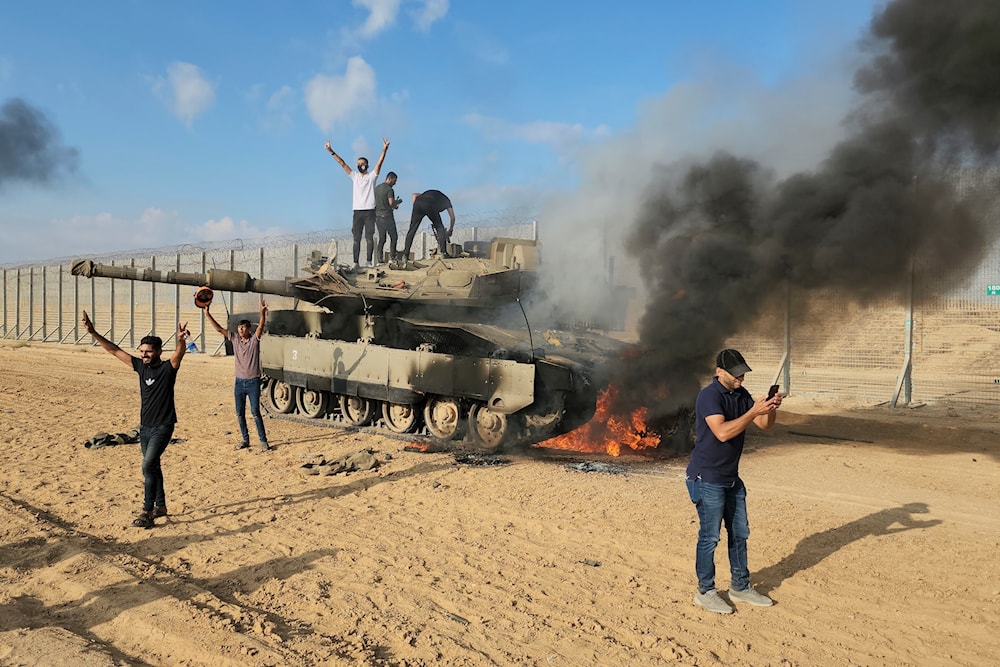IOF ignored intel of threats before Oct.7: Israeli media
Israeli media reports indicate that Israeli intelligence detected Hamas planning an attack on the occupied territories but failed to act on the warning, leaving the reasons for inaction unclear.
-

Palestinians celebrate by a destroyed Israeli tank at the Gaza Strip fence east of Khan Younis on October 7, 2023. (AP)
Israeli media reported on Monday that an IOF intelligence unit had gathered information about a potential rocket attack on the occupied territories before October 7 and detected "unusual activity" from Hamas' aerial force, suggesting the group may have been on high alert.
According to Ynet, the indications, including the potential rocket fire and other gathered intelligence, were discussed during IOF consultations in the following hours. However, they did not lead to a decision to raise the alarm about a possible Hamas operation or prompt any significant actions.
According to the report, this information was included in documents reviewed by senior government and security officials and was used in their arguments for the resignation of Chief of Staff Herzi Halevi.
'They knew, but didn't act'
Contrary to earlier reports, the report reveals that the IOF not only believed Hamas was preparing for a military exercise or to defend against a potential Israeli attack but also seriously considered the possibility of an imminent operation in the occupied territories.
However, the report states that despite these concerns, the IOF chose a limited number of actions. The IOF opted to protect sensitive intelligence sources rather than prioritize preparedness. These revelations highlight a crucial aspect of that night, with a participant in recent consultations describing the situation as "a nuclear bomb."
Since the operation, the report indicates, additional intelligence, such as the use of Israeli SIM cards and the deployment of emergency assets in the Strip has surfaced.
On that note, a participant in the discussions revealed that a senior officer had questioned why no steps were taken to prepare for a rocket attack, including relocating the thousands of people at the Nova music festival near the border, where there were insufficient shelters to protect against rocket and mortar strikes, the report stressed.
Southern Command summary
As mentioned in the report, at 2 am, the Air Force duty command center was alerted to unusual activity in Hamas' aerial units. At the same time, additional indications of preparations for a rocket strike were received. This information was discussed during a call between Yaron Finkelman, the chief of Southern Command, and other senior officers, Shin Bet representatives, and an Air Force representative, who concluded simply, that an "unusual activity was identified."
Finkelman outlined three possibilities, with the third being an attack.
The report mentioned that a Summary of the Southern Command's consultations was delivered to Chief of IOF Operations General Oded Basyuk, who conducted several telephone calls.
He wrote "After consulting the deputy head of Shin Bet, commander of the Southern Command, operations commander and intelligence research department chief, there are three possible scenarios," adding that "A Hamas drill, increased preparedness to defend against an Israeli attack, preparations for an operation against Israel in the coming hours including incursion from the sea or a strike on the gas rig, breaching the border, abduction, shooting attack, rocket attack and an incursion from the air."
As per the report, Finkelman ordered several actions, including a review of "Israel's" aerial defenses around the gas rig. Despite reportedly recognizing the risk of a rocket strike, abduction, or "an unusual terror attack," the conclusion was to prioritize safeguarding sensitive intelligence sources and coordinating actions with military intelligence.
That said, the Ynet report added that a later review revealed that the Intelligence Forces' operational brigade was not consulted about the possible deployment of forces along the border during the overnight hours, sparking an ongoing debate over responsibility for the failure to "contain" the event.

 4 Min Read
4 Min Read








